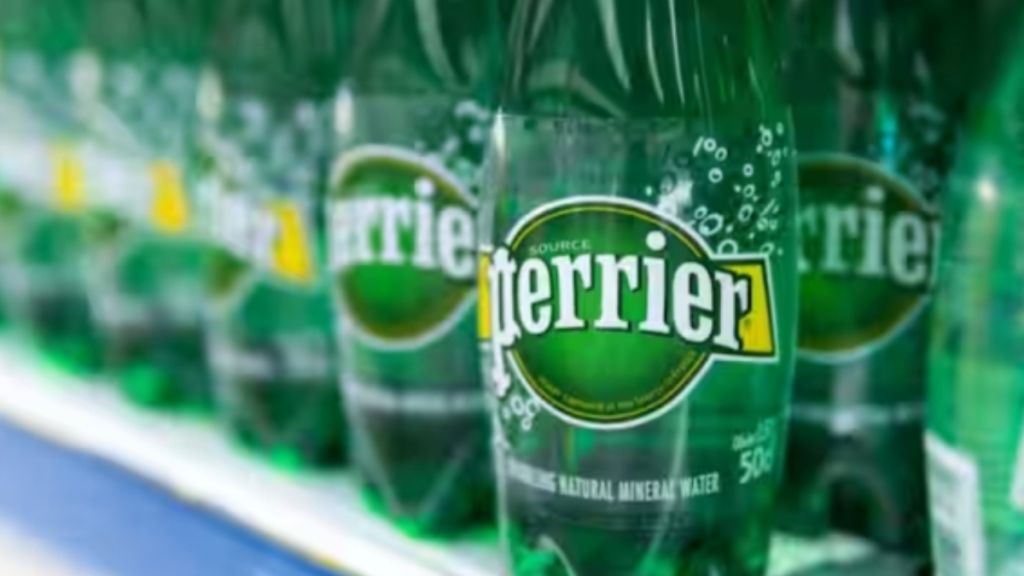
Paris: Will Perrier, the world famous sparkling water with its pretty green glass bottles lose its label that says “natural mineral water”? Nestlé’s iconic sparkling water brand could be on the verge of extinction. A new confidential report from the Regional Health Agency of the French region of Occitanie confirmed that Perrier could lose its natural mineral water label, a label that is the very identity of the brand which has been in the market for more than 160 years, since 1863.
The report calls on Nestlé to consider stopping production at its historic site in Vergèze, 15 kms from the city of Nîmes, in the Department of Gard owing to a virological risk. The site has been blacklisted since April this year after successive inspections found contamination of faecal origin.
Eau gazeuse "Perrier": un rapport pointe la contamination des ressources en eau pic.twitter.com/oH6CXpZ4jY
— BFMTV (@BFMTV) December 17, 2024
This time, the Health Agency “invites” the Swiss agri-food giant to “strategically consider another possible food use for the harnessing of current mineral water catchments provided that additional health safety guarantees are given.”
The conglomerate however emphasizes that the report in question “is a preliminary administrative report, which has since been supplemented by technical clarifications provided by Nestlé Waters on all the points raised. It therefore does not constitute a definitive recommendation on the operating conditions of our mineral water site in Vergèze.”
It adds, “this report does not call into question the food safety of our bottled waters. All waters marketed by Nestlé Waters, including the ones under the Perrier brand, can be consumed in complete safety.”
The Prefect office of the Gard department, which is responsible for the suspension of production, will have to decide on Nestlé's request of October 2023 to renew its operating permit for the “Perrier source.” This decision could be disclosed as early as the first half of 2025 after receiving the opinion of hydrogeologists approved in matters of public hygiene.
The first suspension of one of the 7 catchments by the Gard prefect office in April 2024 prompted Nestlé to destroy a whopping 3 million bottles. The problem was then attributed to an episode of intense rain which could have affected the quality of the groundwater in the area.
To compensate for the insufficient quality of its water, Perrier had reinforced its microfiltration treatment. A method used to allegedly mask the contamination of its mineral waters in order to be able to market them. According to the health inspectors, these treatments have “a proven disinfectant effect and aim to compensate for insufficient raw water quality.” This is a “deviation” from the standard.
Other methods that fell through the cracks were the use of UV filters and activated carbon. Prohibited methods that Nestlé has admitted to having deployed for several years in Vergèze but also in the Vosges. The group also went to the extent of launching another range of drinks with the name ‘Maison Perrier’, omitting the ‘natural mineral water’ label and therefore without being obliged to adhere to same health criteria.
Furthermore, in February 2023, the government helped to relax the standards for microfiltration, against the advice of the National Health Agency. According to information provided by the investigation unit of Radio France radio channel and the leading French national daily newspaper, Le Monde, Nestlé, during a confidential meeting at the Ministry of the Economy admitted to using banned filters as early as 2021.
The Swiss multinational had then requested an exemption to use certain filters. And despite the negative opinions of the General Inspectorate of Social Affairs and the National Health Agency, the government of Elisabeth Borne who was the Prime Minister then, granted this exemption in February 2023.
This government would therefore have neglected this viral risk, namely, adenovirus, norovirus, hepatitis A. The National Health Agency recalls that “microfilters have no retention effect on viruses” and regrets that they were never informed about the presence of these viruses in the water.
A senatorial inquiry commission has been launched this month to shed light on the prohibited treatments used by industrialists in the sector, but also on the responsibility of the public authorities in this affair. The rapporteur of this commission declared that he will now examine whether a secret conspiracy was brewing between the Swiss conglomerate giant and the then French government.